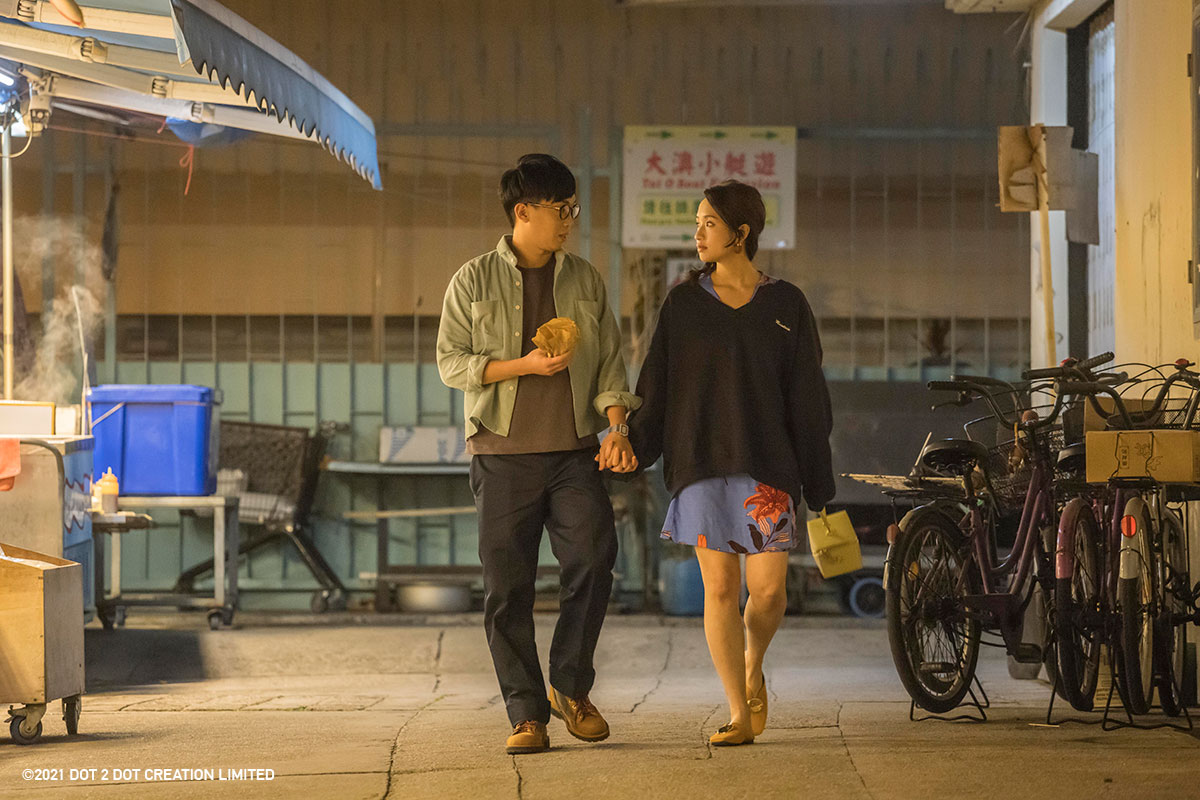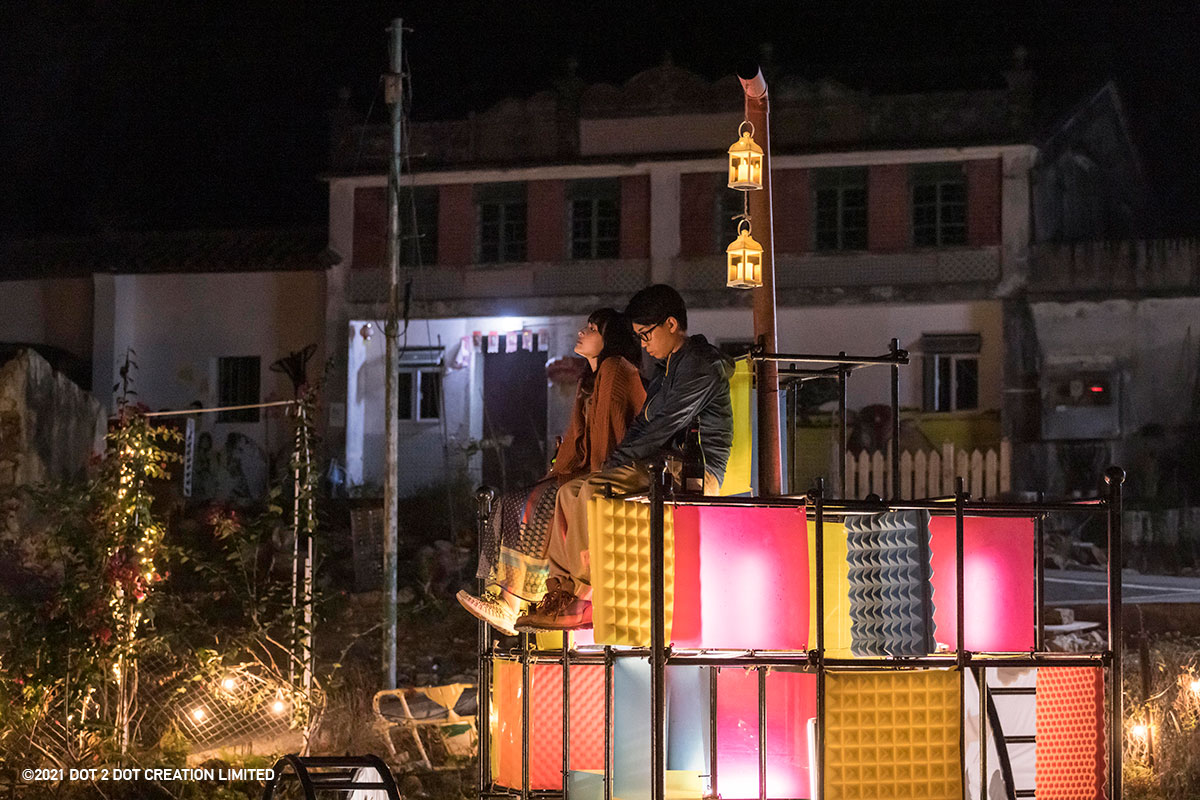- International Premiere
Special Programs < Special Focus on Hong Kong 2022 >
Far Far Away
緣路山旮旯
Director: Amos WHY (黃浩然)
2021|Hong Kong|95min|Language: Cantonese|Subtitles: English, Japanese
| Date | Time | Venue |
|---|---|---|
| 3/14 Mon | 18:40 *Sold Out | Cine Libre Umeda 4 |
| 3/20 Sun | 10:10 | ABC Hall |

- Starring
- Kaki SHAM (岑珈其)
Cecilia SO (蘇麗珊)
Rachel LEUNG (梁雍婷)
Hanna CHAN (陳漢娜)
Jennifer YU (余香凝) - Synopsis
Our main man in this rom-com is Hau (Kaki SHAM) and he is a dork. Surrounded by tech bros and artistes, this computer- savvy wanna-be Casanova doesn’t really stand out to the opposite sex until he suddenly gets his moteki moment as he inexplicably becomes the object of affection for five attractive women. Each woman is different but they share one thing in common: they all live in remote corners of Hong Kong. If Hau wants true love, he’ll have to be willing to travel far far away to test out dating each woman.
After years of being a sidekick, rising star Kaki SHAM finally takes a lead role in this hip and glossy film where he is surrounded by a variety of Hong Kong’s top actresses (Hanna CHAN, Rachel LEUNG, Jennifer YU) playing romantic partners and, along the way, indie director Amos WHY offers his audience a chance to see and appreciate parts of the city they rarely get to see, complete with on-screen graphics and maps to give directions.
[Jason MAHER]
- Director's Message
-
In this light romantic comedy, a nerdy boy manages to date several girls throughout the course of a year. This typical “beauty and the beast” story is not dissimilar to the Japanese series 101st Marriage Proposal, the South Korean feature My Sassy Girlfriend or even the Thai feature film Heart Attack.
If you add a few more local elements and mix in the issue of "land shortage" in Hong Kong, the film will resonate even more with local audiences. All the characters in this story have various longings in life and face different choices about where to live and whether to buy or rent their homes, which reflect a great deal about their directions in life. The five female protagonists in the film live in far off corners of the city, and like characters in a video game, each one lives further away than the other, and presents our male protagonist with ever greater challenges, leading to many hilarious situations.
Hong Kong people have had a tough time in the past two years. If they want to experience the cruelties of life, they need only to turn on the news, watch a documentary, or even just look into the mirror. In making this feature film, I chose to use a light touch, but at the same time, provide a realistic atmosphere, so that at least Hong Kong audiences would recognize themselves in it. In many films, the protagonist of the story must experience growth, and no matter how far they live and how far from home they have ventured, they are unavoidably influenced by their original families. Hau, our protagonist of this story, envies an old colleague for having the courage to travel around the world and is jealous that the colleague gets to do so with his partner.
The previous generation of Hong Kong immigrants to other countries went back and forth between their new homes and Hong Kong, for it was important that they continued to earn money. However, when today's young Hong Kongers consider emigrating abroad, they want to stay together with their families. At first, Hau desires a partner with a similar temperament as he, but later discovers that contrasting dispositions can also make for a harmonious relationship, for unity is the key. Growing up means drawing one stage of life to a close, learning to let go, saying goodbye to the past, moving out of one’s comfort zone and bravely stepping into the unknown future.
The film also inevitably touches on two issues: distance from home and dating culture.
What constitutes a home? Hau was raised by his grandparents, but can that be considered a complete family? Emigration and working across country borders have divided countless families, so how should we deal with the fallout? Hong Kong people like to think about their city as being very small, but there are many couples with the boyfriend living in Tuen Mun while the girlfriend resides in Aberdeen or Chai Wan. Such pairings are actually quite common. The commute between the two locations by public transport is longer than a flight to Taiwan, so such young couples like to say that they are in a long-distance relationship, while for the older generation of Hong Kongers, a long-distance relationship usually describes one that is separated by national borders.
Many foreigners appreciate living in Hong Kong because the countryside is just a short distance away and it is very convenient for people to enjoy nature; yet for locals, the countryside is far, far away. The notion of ‘distance’ is relative to most people, but no matter near or far, many independent Hong Kong women no longer think it is necessary to have their partners take them home. However, many people in society still consider it somewhat ‘chivalrous’ for men to see their dates home. As with many things, different people have opposite views on the same issue, which makes Hong Kong such an interesting place.


